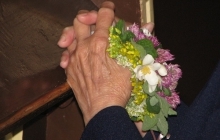Just after the 12 years of exile of the Pandavas was completed, they were considering where to spend the remaining 1 year incognito. Once they became overwhelmed with thirst (much like what happened to Maharaja Pariksit). A distant lake was spotted, and one-by-one the Pandavas went to quench their thirst, and died instantly when they drank from the lake, not heeding the warning of a crane to first answer his questions before they drank. When Yudhisthira came to the lake, he was stunned seeing his dead brothers lying by the side of the lake.
As with his brothers, Yudhisthira heard the voice of the crane warning him to not drink from the lake without answering his questions. The crane then transformed his shape into a Yaksa, who then posed very deep questions of Maharaja Yudhisthira.
"I am a Yaksa, not a bird. Hail to you! It was I who killed your energetic brothers for their own faults. Although forbidden to drink, they disregarded me. If one loves life, he should not attempt to take this water by force. The lake is mine and one may take its water only after answering my questions." "O Yaksa, I do not wish to take what is yours. I shall try to answer your questions to the best of my ability. Please ask me what you will."
Finally the Yaksa said, "I am satisfied. Answer my last four questions and I will restore one of your brothers to life. Who in this world is happy? What is the most wonderful thing? What are the tidings of this world, and how can one find the eternal path of religion?"
With folded palms Yudhisthira replied, "He who is neither in debt nor exiled and who lives simply, eating simple food in his own home, is happy. The most wonderful thing is that although every day innumerable creatures go to the abode of death, still a man thinks he is immortal. The tidings are that in this world--which is like a cauldron with the sun as its fire, days and nights as its fuel, and months and seasons as its wooden ladle--all creatures are being cooked by time. The eternal religious path is found only in the heart of great mystics." The Yaksa smiled. "You have rightly answered every question. Tell me which of your brothers you wish to have restored to life?" "O Yaksa, let Nakula, tall, endowed with a broad chest and long arms, be brought to life."
The Yaksa was surprised. "Bhimasena is surely more important to you than Nakula, O King, and Arjuna is your chief support. Why do you ask for Nakula to be revived?" "He who sacrifices virtue is himself destroyed," replied Yudhisthira, "and he who preserves virtue is in turn preserved by it. I am therefore careful to always observe virtue. For me, great virtue lies in refraining from cruelty; it is superior to all worldly gain. Thus I ask for Nakula. Both Kunti and Madri are the same to me. In myself Kunti still has one son, but Madri now has none. With a desire to behave equally toward my two mothers, I ask for the life of Nakula."
"Since, O Pandava, you consider abstention from cruelty superior to both profit and desire, then let all your brothers be restored to life." As the Yaksa spoke, the four brothers rose from the ground as if from a sleep. They felt refreshed and free from hunger and thirst.






